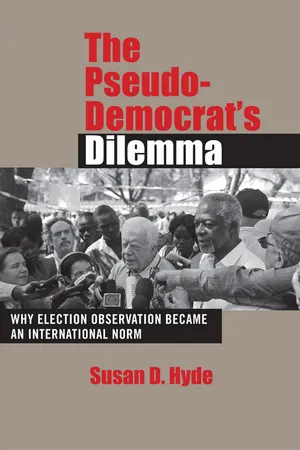
The Pseudo-Democrat's Dilemma
Why Election Observation Became an International Norm
- 264 pages
- English
- ePUB (mobile friendly)
- Available on iOS & Android
About This Book
Why did election monitoring become an international norm? Why do pseudo-democrats—undemocratic leaders who present themselves as democratic—invite international observers, even when they are likely to be caught manipulating elections? Is election observation an effective tool of democracy promotion, or is it simply a way to legitimize electoral autocracies? In The Pseudo-Democrat's Dilemma, Susan D. Hyde explains international election monitoring with a new theory of international norm formation. Hyde argues that election observation was initiated by states seeking international support. International benefits tied to democracy give some governments an incentive to signal their commitment to democratization without having to give up power. Invitations to nonpartisan foreigners to monitor elections, and avoiding their criticism, became a widely recognized and imitated signal of a government's purported commitment to democratic elections.Hyde draws on cross-national data on the global spread of election observation between 1960 and 2006, detailed descriptions of the characteristics of countries that do and do not invite observers, and evidence of three ways that election monitoring is costly to pseudo-democrats: micro-level experimental tests from elections in Armenia and Indonesia showing that observers can deter election-day fraud and otherwise improve the quality of elections; illustrative cases demonstrating that international benefits are contingent on democracy in countries like Haiti, Peru, Togo, and Zimbabwe; and qualitative evidence documenting the escalating game of strategic manipulation among pseudo-democrats, international monitors, and pro-democracy forces.
Frequently asked questions
Information
Table of contents
- FIGURES AND TABLES
- ACKNOWLEDGMENTS
- INTRODUCTION
- 1 SIGNALING DEMOCRACY AND THE NORM OF INTERNATIONALLY OBSERVED ELECTIONS
- 2 SOVEREIGN LEADERS AND THE DECISION TO INVITE OBSERVERS
- 3 DEMOCRACY-CONTINGENT BENEFITS
- 4 DOES ELECTION MONITORING MATTER?
- 5 THE QUALITY OF MONITORING AND STRATEGIC MANIPULATION
- CONCLUSION
- Appendixes
- SELECTED BIBLIOGRAPHY